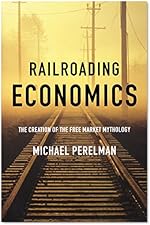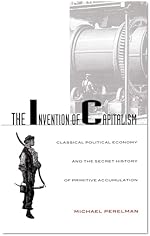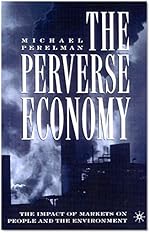About
Michael Perelman teaches economics at California State University, Chico. He has published 19 books, including, The Confiscation of American Prosperity, Railroading Economics, Manufacturing Discontent, The Perverse Economy, and The Invention of Capitalism.

 25 – The Confiscation of American Prosperity: From Right-Wing Extremism and Economic Ideology to the Next Great Depression
25 – The Confiscation of American Prosperity: From Right-Wing Extremism and Economic Ideology to the Next Great Depression 30 – Manufacturing Discontent: The Trap of Individualism in Corporate Society
30 – Manufacturing Discontent: The Trap of Individualism in Corporate Society Class Warfare in the Information Age
Class Warfare in the Information Age Railroading Economics: The Creation of the Free Market Mythology
Railroading Economics: The Creation of the Free Market Mythology Steal This Idea: Intellectual Property Rights and the Corporate Confiscation of Creativity
Steal This Idea: Intellectual Property Rights and the Corporate Confiscation of Creativity The Invention of Capitalism: Classical Political Economy and the Secret History of Primitive Accumulation
The Invention of Capitalism: Classical Political Economy and the Secret History of Primitive Accumulation The Perverse Economy: The Impact of Markets on People and the Environment
The Perverse Economy: The Impact of Markets on People and the Environment
Have you considered updating “The Pathology of the US Economy”?
It’s an excellent book, but unfortunately most of the information is only current up to the late 80s or early 90s, and so many economic changes have happened since that time.
I’m particularly interested in stats on:
* Changes pertaining to the section on Adding Insult ot Injury (p. 46-48): wage cuts/freezes, hours of work, job security, part-time labor, health insurance coverage, etc.
* Changes in productivity and wages (Table 2.1, p.56)
* Decreases in net social wage (p. 66)
* Stock market trades and receipts (p. 167)
Thanks.
David Ward
P.S. If you reprint or update the book, I will offer myself as a copy editor. I noticed many words left out, spelled wrong, repeated, etc. in the version I have (St. Martins Press, 1996, ISBN: 0-312-12685-9)
I have updated it.
The Pathology of the U.S. Economy Revisited: The Intractable Contradictions of Economic Policy (NY: Palgrave, 2001).
Professor Perelman,
Your name came up on the discussion of heterdox economics at talkingpointsmemo book club and I thought I might run an idea past you. A friend talked me into writing an essay on some observations of mine, http://www.exterminatingangel.com/index.php?option=com_content&task=view&id=203&Itemid=118, and I thought I might check around to see if they might be of interest.
The essential point is that for all intents and purposes, money functions as a form of public utility, yet we continue to think of it as private property. Since it evolved out of barter and for much of history was minted out of precious metals, this assumption is logical, but the fact is that with its value being a function of trust in government accountability and the taxpayer and a healthy economy being the basis of this trust, it now has more in common with a public roads system. If the paradigm were of money as public utility, then wealth would be as much a responsibility to the larger economy, as it is a right to direct that economy. When money is viewed as just another commodity, there is little obligation beyond the Darwinian imperative to maximize one’s position and taxes are considered a form of extortion. The free market is an ecosystem within the belly of a healthy society and money as public utility would clarify that relationship, rather then the current assumption that the market is an ecosystem in which societies are little more then prey.
Regards,
John Merryman
Professor, I agree with much of your stance on the transition of wealth being a highly orchestrated planned transfer of wealth, monetization of politics and corporate control of media to exert this dominance over the mass working class. Since we must now deal with these issues along with global terrorism, energy crisis and addiction to fossil fuels, global warming, lack of affordable and comprehensive health care, trade deficits and a balanced national budget.
How would you create a fair and non-punitive tax system to deal with our great hole we are in now? What fiscal policies should also be changed to address these issues now? What should the next president do in the first 100 days?
Professor Perelman,
I am very interested in your books from the information that I have been able to access. I would love to be able to read/listen to them. Are any (particularly the latest) available — or planned to be available — in audio format or at least in large print? My vision has deteriorated over the last thirty years, due to a neurological condition that has been effecting me at least since I was a teenager. Please consider, or let me know.
mlpw =^..^=
Its a pity that there is this natural tendency that humans prefer beautiful illusions painted by marketing rather than facing facts. The “fiat currency” dogma is already deeply planted into humans.
The truth always hurt.
You have my utmost respect. Like what Sir Thorstein Veblen wrote in his ” The Engineers and the Price System”, its always the the overall commonwealth vs the vested interest.
Michael, After hearing you on KPFA this afternoon, I looked you up online, and eventually found my way here. (It would have been a lot easier had the host pointed out that your name is PERELman — not PEARLman or PERLman… ) I want to thank you for your “Intellectual Biography” — it made for fascinating reading. I wish more academics would take the time to write & post comparable essays. Unfortunately, all of the links to http://www.napak.com are now useless as those pages have all been removed from that website. PS – If I might make a suggestion, it would be nice to have a concise chronological list of all of your books, including the basic publishing info.
I heard you today on KPFA and would like to talk with you about your book and my film that appear to be covering the same material with the same approach. I can be reached at 520-527-1761. I look forward to hearing from you, including this weekend.
Sorry the area code is 510.
Hi Michael, could you send your email to me again, as it does not appear to have arrived? When I get it, I can then send you the info you requested as to my other films.
Prof. Perelman, I wonder if you’d consider crossposting at our site. EP is a community site for economics, and we’ve grown from nothing to 3000 page views a day in a little over a year, and up to #31 econ blog at gongol.
It certainly seems like you would fit right in, and it would give more exposure to your work.
In any event, all the best to you.
Michael,
I was just wondering something- have you written any books or planning on writing any books that critique conservative defenses of capitalism or even conservative critiques of socialism or radical economics? Also, I’m curious about your thoughts on postcapitalist alternatives such as “Participatory Economics” and various self-managed, market-socialist proposals.
I’m curious as to your thoughts particular on a supposed “law-of-wages” that was supposed to have been formulated by John Bates Clark. I guess this law is supposed to show that Marx is wrong and that capitalism is not exploitative but I am not completely sure if that is accurate. Any comments on this?
Thanks!
Matthew
Matthew, thank you for your comment. I discussed John Bates Clark in a number of my books, including Railroading Economics. His “law” is silly, just a way of saying that everybody gets what they deserve. I have not critiqued participatory economics or other market socialist alternatives. That is not where I think I can do the most good.
Hi Michael,
I have just visited your blog and am writing to try and arrange a quick discussion on the information you currently show as I recognize synergies between our respective websites and an opportunity we can both benefit from. I’m also keen to find out if you would be interested in writing for our site.
My name is James Stafford and I run the website OilPrice.com, where we focus on finance within the commodity sectors and after having researched your various pages I wanted to make you aware that we welcome blogs such as yours to publish (at no cost) our Energy & Commodity Price Charts, Quotes and Data Panels, which cover: Crude Oil, Gold, Silver, Natural Gas, etc…
Please take a look at http://www.oilprice.com/charts.php to see what is available.
I would like to clarify that the information is very well presented and doesn’t carry adverts or anything else that would impair the quality for your visitors.
The second reason for my writing is that we aim to provide our visitors with excellent financial information and are looking for professionals like yourself to contribute articles.
We currently have a Page Rank of 6 and even though we only recently launched are receiving over 1,700 visitors a day (this number is growing rapidly.)
Any article we receive is promoted through social media and optimized for maximum visibility with the Search Engines.
Your article would appear on our homepage and be there for about a week and then it will be filed in the relevant sector category it belongs, which are also popular amongst our readers.
I realize you may already have distribution channels in place and are possibly quite content with the exposure they bring you, but I would very much like you to at least consider working with us. We may be a new company, but we are promoting the site heavily and have the necessary backing and marketing experience to make OilPrice.com a major online financial destination.
If you are interested in writing for us I’d very much like to hear from you, but if you decide against it I hope you have a chance to look at the Widgets we are offering as I believe they can greatly compliment your site.
I hope you find our site both interesting and useful and if you have any questions please don’t hesitate to send me an e-mail or give me a call.
Yours sincerely,
James Stafford
Managing Director
OilPrice.com
Hi Michael,
I wanted to see what your thoughts on gold were… do you think the price of gold is inflated or will it continue to climb?
In your new book, I may suggest you mention the affects of the 80 years war on the territory known as Holland. Question: After the protestants accended their own princes, are any cause and effect relationships revelant between the outcome of that war and the establishment of markets in holland.
Holland via military action “took back” New Amsterdam (new york city from the brits), Did this confict generate any pecular market activities when New Orange became New York?
What are the peculiar characteristics of the Buttonwood Agreement? What is the legal machinery behind this compact?
One last point. I read railroading economics and enjoyed it. Would you agree that when a man working under a corporate charter, (protected from libel and slander cause being the limited liability nature of c’s, AND western judges not willing to piece the corp vail) imposes his will on others primarily via adopting the imaginations of others to impose his(her) will.
Or — Capital requires or depends on the legal machinery of adopting others imaginations, for the primary intent of imposing their will on others. Valid or invalid?
Sorry about the long babble.
Hi Michael,
I ilve in Redding, Ca. and I’m interested in connecting/meeting with Socialists. I’ve tried working with the Democratic Party, and with inside/outside Progressives, but the truth is that I’ve been a radical (in the sense of going to the root of the problem which is capitalism) since my college days in the 70s, so I don’t feel at home in these circles. It’s time for me to return to my own roots. Can you provide any guidance?
the functionality of this site seems a bit odd. It seems that I can’t subscribe to the email notice unless I post a comment. I loved your Railroading Economics. Do I detect an Abba Lerner connection a’la economic sociology, a’la economic knowledge via the sociology of knowledge? Tadit Anderson
Dear Professor,
In the past few months I have come across your blog and as a result read 2 of your books: The Confiscation of American Prosperity, and The Invention of Capitalism, both of which I found to be extremely well written and informative. The invention of capitalism filled a nice void in my understanding of primitive accumulation, which I had previously encountered in my reading of Marx’s Capital I (in conjunction with David Harvey’s online course on Capital I) and in Galeano’s Open Veins of Latin America. The Confiscation of American Prosperity helped me to connect the collusion between of right wing, big business, the media and academia in the U.S. Additionally I see from your bio that you had a somewhat unusual path towards becoming an econ prof (i.e. traveling after undergrad, masters interest in literature, and finally PhD in Agricultural Econ).
I am writing to 1)Thank you the extent and nature of your work, books and blog
2) Ask for advice as far as pursuing graduate work. I have completed an undergraduate economics degree (University of Toronto, 2009), and was wondering if you could comment on the importance of getting into a grad school that encourages pluralistic, non-mainstream approaches to economics versus well regarded albeit math-heavy mainstream programs. Would you recommend any?
-Additionally, in your experience how important is the completion of graduate school (MA or PhD) in pursuing non-academic avenues for affecting change: think tanks, advocacy, etc.
-Do you feel your position as a prof has afforded you the training/time/platform from which to affect change on the world most effectively?
Thanks for your time, if you happen to be able to answer/comment I would greatly appreciate it, if not thanks anyhow and I look forward to following your blog.
Regards,
Your interview on KDVS was riveting. Looked up your page at csus and, alas, noted a few typos!
Dear Michael Perelman,
What is value? Let me know which book of yours defines value.
Thanks.
[Radio Interview Request] from TBS eFM, Seoul Korea to Prof. Michale Perelman
Hello!
My name is Andrea Soh and I’m with a talkshow on radio called “1013
Main Street” on tbs eFM. The program is hosted by Ahn Junghyun who was
the former presenter for the Pyeongchang Olympic Bidding Committee.
She was also the main host for the B20 Seoul Summit held last year.
We were wondering whether we might have the honor to have you on our
program for a 10 minute interview .
We would like to talk about your book which also very popular to Korean readers and the ordinary FAQ you get.
If you are interested and have the time to speak with us
please drop a line at 1013mainstreet@gmail.com and
we will, of course, provide questions in advance
and let you know what the times available to do the interview is
so that you can choose on a day and time you prefer.
Thank you very much!
We’ll look forward to hearing from you.
Yours respectfully,
Andrea Soh
(+82-10-9009-4954)
—
1013 Main Street
Monday – Friday 10am till Noon
on tbs eFM 101.3MHz
http://tbsefm.seoul.kr/efm/1013MainStreet/
Follow us on Twitter @1013mainstreet
[…] About « unsettling economicsCraig Gingold on December 5, 2008. Michael, After hearing you on KPFA this afternoon, I looked you up online, and eventually found my way here. (It would … […]
Hi,
How are you?
We recently ran the article ‘20 New Economic sites you should read’ on Mindful Money which featured your blog. http://www.mindfulmoney.co.uk/12649/knowledge-bank-/20-new-economic-sites-you-should-read.html
The piece was part of a wider series exploring the ‘New Economists’ and their ideas for alternative approaches to neo-classical thinking. The series was well received but only scratched the surface of an area that we feel deserves a wider and continued discussion than currently exists in the mainstream media.
So to do that, we’d like to pick up where we left off, starting with a brief Q&A with some of the major players and would really appreciate it if you had a few minutes to answer our Q&A. It will be published on the homepage of Mindful Money and form part of our wider coverage in this area. And of course we would keep you informed of any further discussion it stimulates.
I look forward to hearing from you,
Marco
Sir, we have exchanged emails previously. While I have greatly appreciated and benefited from your books, I recently stumbled across a reference to Benjamin Farrington in Clifford Conners’s book A People’s History of Science. His chapter “What Greek Miracle” seems largely derived from Farrington’s “Science and Politics In the Ancient World.” It seems that Farrington was quite resonating to your scholarship as well, though without the reference by Conners I doubt that I would have discovered Farrington at all. As mysterious was a book entitled The Invention of Racism in Classical Antiquity by a classics scholar (as was Farrington) Benjamin Isaac whom upon my correspondence with him he had never heard of Farrington’s Science and Politics in the Ancient World at all. Somehow through the excessive divisions of academic labors Farrington’s efforts seem largely forgotten. I have transcribed two of Farrington’s lectures “The Challenge of Socialism” and “Has History a Meaning?” onto the web. His material would perhaps add even further depth to even your very considerable efforts. I have to wonder how it is that efforts such as Farrington’s have been virtually lost to economic history as a realm, rather than only to academic lineages. At the least Leslie Kurke’s Coins, Bodies, Games, and Gold would have been amplified by knowledge of Farrington’s writing, though she seems to have been isolated within her nominal academic occupation. This may indicate the “Plato as the philosopher-king of liars and elitism”-mania/necrophilia which seems to continue within academic culture.
In appreciation, Tadit Anderson
Hi Michael,
having been locked out of my old email address marquequark at yahoo dot com and having been unable to contact you through other means, i am writing to let you know that my new email is the same as the old with the addition of the numeral 2 after marquequark.
you were kind enough to send a a pdf of the Confiscation of American Prosperity since the library in redding refused to put it on their shelves.
since i am locked out of the old email i have lost access to that.
i just finished reading the Invisible handcuffs of capitalism.
we shall see if they put that on the shelves.
I got the books through a thing called the “zip books” program.
wherein the library orders the book and it is sent directly to the recipient’s home and then after reading it is taken to the library for them to deal with as they please.
here’s hoping you read this so that we can continue our occasional emails.
mark hansen
redding, ca
Michael, I haven’t seen or heard of you for several years. We met at Modern Times book store some years back, and I have ordered and read several of your books. Is there anything up to date as we struggle through these rough, rough times of little control over insanity. I was a member of Technocracy Inc., an organization whose existence you were aware of. So much changes and so much remains the same. Pam
[…] to political economy due to the failure of post crisis reforms to fix much of anything. Perelman had a blog on which he posted intermittently; I’d sometimes ping him about his posts. Even when he was […]
[…] to political economy due to the failure of post crisis reforms to fix much of anything. Perelman had a blog on which he posted intermittently; I’d sometimes ping him about his posts. Even when he was […]
[…] to political economy due to the failure of post crisis reforms to fix much of anything. Perelman had a blog on which he posted intermittently; I’d sometimes ping him about his posts. Even when he was […]
[…] to political economy due to the failure of post crisis reforms to fix much of anything. Perelman had a blog on which he posted intermittently; I’d sometimes ping him about his posts. Even when he was […]
[…] to political economy due to the failure of post crisis reforms to fix much of anything. Perelman had a blog on which he posted intermittently; I’d sometimes ping him about his posts. Even when he was […]
[…] to political economy due to the failure of post crisis reforms to fix much of anything. Perelman had a blog on which he posted intermittently; I’d sometimes ping him about his posts. Even when he was […]
[…] to political economy due to the failure of post crisis reforms to fix much of anything. Perelman had a blog on which he posted intermittently; I’d sometimes ping him about his posts. Even when he was […]